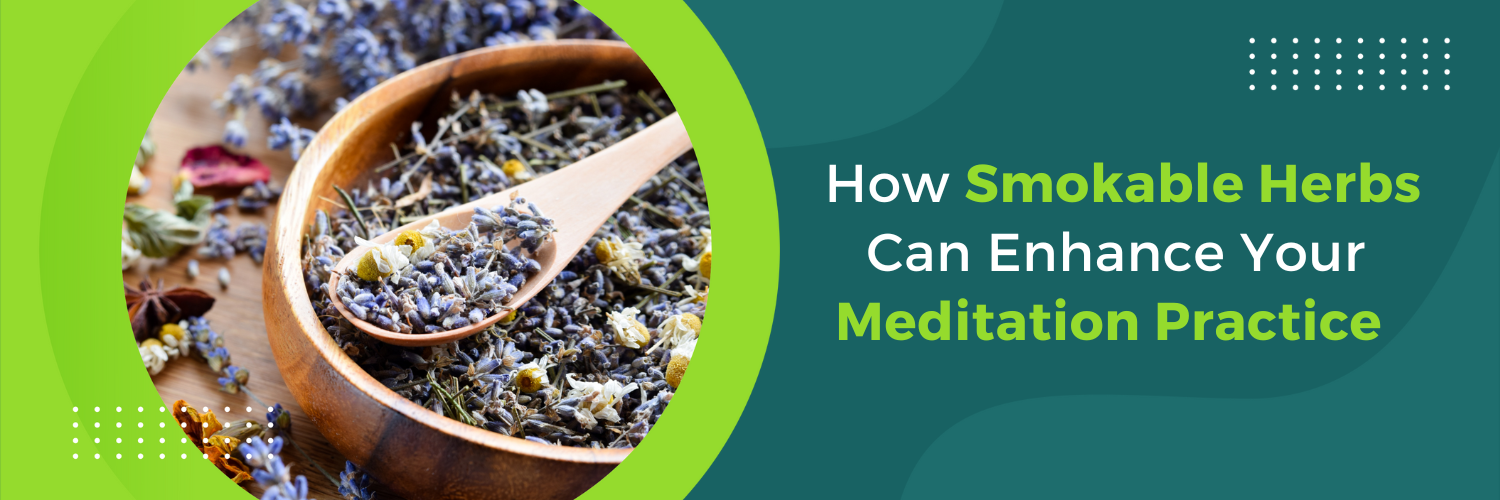History of Smokable Herbs
Smokable herbs have a long history of use in various cultural and spiritual practices, including meditation. The act of inhaling aromatic plants as part of a meditative ritual has been prevalent in different civilizations, from ancient Native American tribes to traditional practices in Asia. In recent years, there has been a growing interest in exploring alternative methods to enhance meditation experiences, and smokable herbs have gained attention for their potential benefits.
As more individuals seek natural and holistic approaches to mindfulness and relaxation, the combination of smokable herbs and meditation has become an intriguing option. This blog aims to dig deeper into the fascinating world of smokable herbs and their potential role in deepening meditation practices. Whether you are an experienced meditator looking to try a new approach or a curious beginner seeking ways to enhance your meditation journey, this blog will provide valuable insights and practical tips.
The Connection Between Smokable Herbs and Meditation
The connection between smokable herbs and meditation is not just rooted in tradition but also supported by scientific principles. For centuries, various cultures have utilized specific herbs to induce altered states of consciousness, spiritual clarity, and relaxation during meditation. These herbs often contain compounds that can positively impact the brain’s neurotransmitters and promote a more focused and serene meditative state.
Research in the field of ethnobotany and psychopharmacology has shed light on the potential benefits of smokable herbs during meditation. For example, certain herbs like lavender have been found to possess anxiolytic properties that can reduce stress and anxiety, making them ideal for calming the mind before meditation. Similarly, herbs like mugwort have been traditionally associated with enhancing dream experiences, leading to profound meditation journeys.
Different smokable herbs possess unique properties that can influence the meditative experience. Some herbs may encourage relaxation and introspection, while others might heighten sensory perception and clarity. Understanding the specific effects of various herbs can help meditators tailor their practices to suit their individual needs and goals.
Popular Smokable Herbs for Meditation
- Lavender: Lavender is renowned for its soothing and aromatic properties. When used in meditation, the inhalation of lavender’s calming fragrance can promote a sense of tranquility and peace, easing the mind into a receptive state for meditation.
- Mugwort: Mugwort has a rich history in dreamwork and spiritual practices. In meditation, mugwort can facilitate vivid and lucid dreams, aiding in the exploration of the subconscious and fostering a deeper connection to one’s inner self.
- Damiana: Damiana is known for its aphrodisiac qualities but is also valued for its ability to induce relaxation and heighten sensory perception. When used in meditation, damiana can help create a heightened awareness of the present moment.
- Passionflower: Passionflower is revered for its calming properties, making it an excellent herb for inducing a tranquil meditative state. It can also help alleviate restlessness and promote inner peace.
- CBD: CBD is believed to have various potential benefits, such as reducing anxiety and stress, promoting a sense of focus and clarity, and supporting overall well-being. Smokable CBD herbs may assist in achieving a deeper state of relaxation and mindfulness, helping individuals center themselves and attain a more profound meditative experience.
- Other herbs: There are several other smokable herbs that can enhance meditation, such as sage, rosemary, and chamomile. Each herb has its own unique attributes that can influence the meditative experience in different ways.
Best Practices for Using Smokable Herbs in Meditation
- Dosage and safety: When using smokable herbs in meditation, it is crucial to be mindful of the appropriate dosage to avoid adverse effects. Moderation is key, especially for those new to the practice.
- Preparation: Proper preparation of the herbs is essential for a smooth and enjoyable experience. Whether rolling the herbs into a joint or using a pipe, ensure that the herbs are finely ground for even burning and optimal inhalation.
- Setting the intention: Before incorporating smokable herbs into meditation, it is essential to set a clear intention for the practice. Whether seeking relaxation, clarity, or spiritual insight, a well-defined intention can enhance the overall experience.
- Combining with meditation techniques: Smokable herbs can complement various meditation techniques, such as breathwork, visualization, and mindfulness. Experimenting with different techniques while using herbs can lead to profound and transformative meditation sessions.
- Cautionary notes: While smokable herbs can be beneficial for many individuals, some may experience adverse reactions or have underlying health conditions that make their use unsuitable. It is important to be aware of potential side effects and consult with a healthcare professional if there are any concerns.
Personal Experiences and Testimonials
Personal experiences and testimonials from individuals who have incorporated smokable herbs into their meditation practices can provide valuable insights into the potential benefits and effects of this alternative approach. While it’s essential to recognize that experiences may vary among different individuals, the following accounts offer a glimpse into the diverse ways smokable herbs can impact meditation sessions:
Sarah’s Calming Journey with Lavender
“I have been practicing meditation for several years now, and while I always found it beneficial, I sometimes struggled to calm my mind and fully immerse myself in the practice. One day, a friend suggested I try using lavender before my meditation sessions. Skeptical but curious, I gave it a shot. The moment I inhaled the soothing aroma of lavender, I felt a wave of relaxation wash over me. It was like all the tension in my body melted away, allowing me to settle into my meditation more effortlessly. The calming effect of lavender has become an integral part of my meditation routine, helping me achieve a deeper sense of peace and tranquility within.”
These firsthand accounts offer a glimpse into the diverse ways smokable herbs can positively impact meditation practices, making them worth exploring for those seeking to enrich their mindfulness journey.
Tips for Sourcing and Choosing Quality Smokable Herbs
When incorporating smokable herbs into your meditation practice, sourcing high-quality herbs is crucial to ensure a safe and enjoyable experience. Here are some valuable tips to help you find and choose the best smokable herbs:
1. Research reputable suppliers: Start by researching reputable suppliers or vendors known for their commitment to quality and transparency. Look for online reviews and testimonials from other customers to gauge the reliability of the supplier.
2. Opt for organic and sustainably sourced herbs: Choosing organic smokable herbs ensures that you are getting a product free from harmful pesticides and chemicals. Additionally, supporting sustainably sourced herbs promotes ethical and environmentally responsible practices.
3. Consider the freshness of the herbs: Freshness plays a significant role in the potency and aroma of smokable herbs. Look for suppliers who guarantee freshly harvested or recently dried herbs to get the most out of your meditation experience.
4. Verify the herb’s authenticity: With the increasing demand for natural remedies, some vendors may sell counterfeit or adulterated products. Before purchasing, ensure that the herb you are buying is indeed the authentic variety you seek.
5. Understand the herb’s properties: Familiarize yourself with the properties and effects of the smokable herbs you intend to use. Each herb has its own unique characteristics, and understanding them will help you choose the right herb for your specific meditation goals.
6. Check for potential allergens: If you have allergies or sensitivities to certain plants or herbs, make sure to check the ingredient list to avoid any adverse reactions.
7. Assess the packaging and storage: Good quality herbs are often stored and packaged in airtight containers to preserve their freshness and potency. Check for any signs of damage or improper packaging before making a purchase.
8. Seek guidance from experienced users: If you are new to using smokable herbs for meditation, consider seeking advice from experienced users or herbalists. They can provide valuable insights and recommendations based on their own experiences.
9. Start with small quantities: If you are trying a new smokable herb for the first time, start with a small quantity to assess how your body and mind respond to it. Gradually increase the amount if you feel comfortable with the effects.
10. Trust your instincts: Lastly, trust your instincts when choosing smokable herbs. If something doesn’t feel right or if you have doubts about a product, it’s best to explore other options that align better with your preferences and intuition.
Potential Risks and Precautions
While smokable herbs can offer numerous benefits when used mindfully and responsibly, it’s essential to be aware of potential risks and take necessary precautions. Here are some important considerations to keep in mind:
1. Individual Reactions: Each person’s body chemistry is unique, and individuals may have different reactions to smokable herbs. Some herbs may induce relaxation and calmness, while others may lead to heightened awareness or even mild euphoria. It’s crucial to start with a small amount and observe how your body and mind respond to the herb before using larger quantities.
2. Possible Allergies: Like any natural substance, smokable herbs have the potential to cause allergic reactions in some individuals. If you have known allergies to specific plants or herbs, check the ingredient list of the herb you intend to use and avoid it if necessary.
3. Interactions with Medications: Certain smokable herbs may interact with prescription medications or over-the-counter drugs. If you are taking any medications or have pre-existing medical conditions, consult with a healthcare professional before using smokable herbs to avoid any adverse effects or unwanted interactions.
4. Overuse and Side Effects: Using excessive amounts of certain herbs may lead to side effects such as dizziness, nausea, or an upset stomach. It’s crucial to adhere to recommended dosages and practice moderation to avoid any discomfort or negative experiences.
5. Caution during Pregnancy: Pregnant individuals should exercise caution when using smokable herbs for meditation. Some herbs may have contraindications during pregnancy and could potentially harm the developing fetus. It’s best to avoid using smokable herbs or consult with a healthcare professional if unsure about their safety during pregnancy.
6. Responsible Use and Age Restrictions: Smokable herbs should only be used by adults or individuals of legal smoking age in their respective regions. It’s important to keep these products out of reach of children and teenagers.
7. Combining with Other Substances: Avoid combining smokable herbs with alcohol, recreational drugs, or other substances. Doing so can lead to unpredictable effects and increased health risks.
8. Sourcing Quality Herbs: Ensure that you are sourcing smokable herbs from reputable and trustworthy suppliers to avoid potential contamination or adulteration.
9. Mindfulness and Intention: Approach the use of smokable herbs for meditation with mindfulness and a clear intention. Set a positive and focused mindset to enhance your meditation experience and ensure a more meaningful practice.
10. Seek Professional Advice: If you are unsure about using smokable herbs or have any health concerns, it’s always best to consult with a healthcare professional or a qualified herbalist. They can provide personalized guidance and ensure that smokable herbs are safe for your specific situation.
By being aware of these potential risks and taking necessary precautions, you can enjoy a safe and enriching meditation practice with smokable herbs. Remember that responsible use, moderation, and self-awareness are key to maximizing the benefits while minimizing any potential drawbacks.
Legal and Cultural Considerations
The legality of smokable herbs varies by region and country. Some herbs may be restricted or prohibited in certain areas, while they are freely available in others. Before using smokable herbs in meditation, it is essential to familiarize oneself with the local laws and regulations to avoid any legal complications.
Cultural and religious considerations also play a role in the use of smokable herbs during meditation. Some cultures have long-standing traditions and rituals involving specific herbs, and understanding the cultural significance can deepen the meditative experience and foster respect for the practice.
Conclusion
Smokable herbs have the potential to enhance meditation practices in various ways. Their historical use and the scientific basis supporting their benefits make them a fascinating option for those seeking to elevate their mindfulness journey. From the calming effects of lavender to the dream-enhancing properties of mugwort, the diverse range of smokable herbs allows meditators to tailor their experiences to suit their individual needs and goals.
It is important to approach the use of smokable herbs mindfully and responsibly, considering potential risks, consulting with healthcare professionals, and understanding the legal and cultural implications. By combining ancient wisdom with modern insights, individuals can explore the synergistic relationship between smokable herbs and meditation to achieve deeper states of relaxation, focus, and spiritual growth.
If you are intrigued by the idea of incorporating smokable herbs like CBD into your meditation practice, Leaf Alleviate offers a wide selection of high-quality, CBD products. Leaf Alleviate provides carefully sourced products to ensure a safe and enjoyable experience. Learn more about how these natural remedies can enrich your meditation practice, visit their website today. Elevate your mindfulness journey with Leaf Alleviate’s premium smokable herbs and embark on a deeper path of self-discovery and serenity.
FAQs
Q: Are smokable herbs safe for meditation?
When used responsibly and in moderation, smokable herbs can be safe for meditation. However, individual reactions may vary, and some herbs may have contraindications for certain individuals or medical conditions. It is advisable to consult with a healthcare professional before use.
Q: Can I use smokable herbs if I am new to meditation?
Yes, smokable herbs can be used by both beginners and experienced meditators. However, those new to meditation should start with mild herbs and be cautious about dosage to avoid overwhelming experiences.
Q: What are the legal implications of using smokable herbs for meditation?
The legality of smokable herbs varies by location. Some herbs may be restricted or prohibited in certain regions, so it is essential to research and comply with local laws before using them for meditation.
Q: How do I know if the smokable herbs are of good quality?
To ensure quality, purchase herbs from reputable suppliers known for their transparency and commitment to sourcing organic and sustainably grown products.
Q: Can smokable herbs replace traditional meditation techniques?
Smokable herbs can complement traditional meditation techniques and enhance the overall experience, but they do not replace the core principles of mindfulness and self-awareness.

















